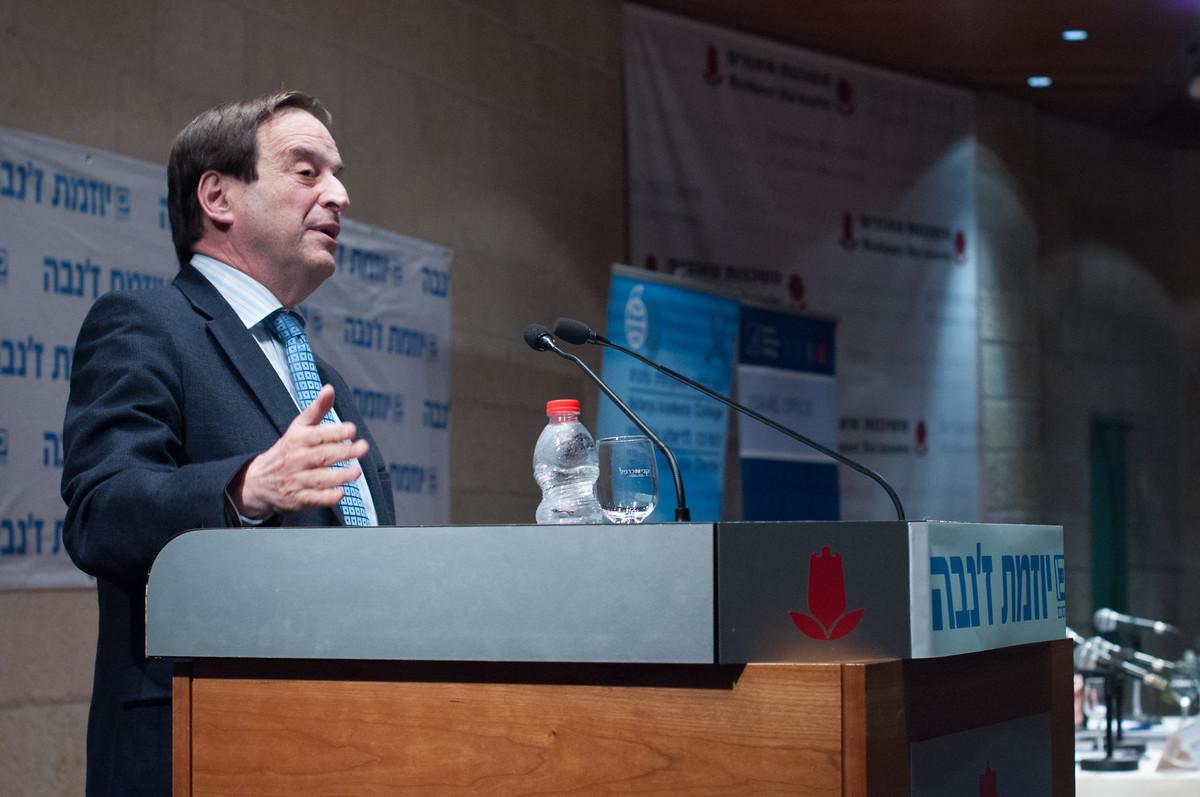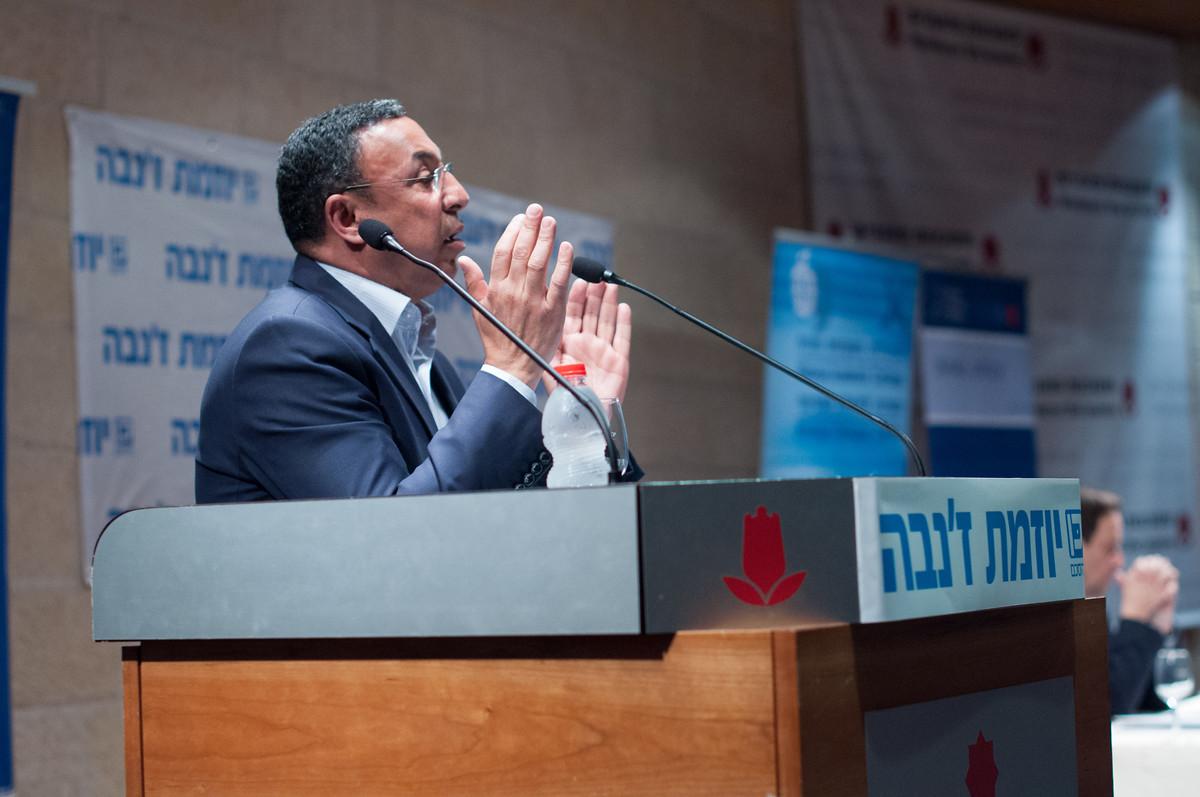Event reports
In his welcoming remarks, Michael Mertes, head of the KAS Israel office, underlined that the Konrad-Adenauer-Stiftung espouses a two-state solution. A two-state solution was a prerequisite for Israel’s prosperous future as a Jewish and democratic state. Mertes also addressed the concern expressed by many Israelis that Europe was not reliable after all. Israel had many loyal friends in Europe and only in December 2013 the EU had offered to engage in a “Special Privileged Partnership, SPP” with Israel and the Palestinians alike if a two-state solution to the Israeli-Palestinian conflict were achieved.
Gadi Baltiansky, director of the Geneva Initiative, opened the first panel which focused on the challenges of the current peace talks. According to Baltiansky, the key elements of a peaceful solution had already been outlined in the “Clinton Parameters” some time ago. There was, however, the fundamental problem that both negotiating parties were caught up in the idea that any advantage for one side corresponds to a disadvantage for the other (“zero-sum game”). But, in fact, a “win-win” situation was the issue at stake; a “lose-lose” situation, on the other hand, would be the consequence, should the negotiations fail.
It was of vital importance that both parties gave up long-held dreams. For the Jewish side he referred to the control over East Jerusalem and the Temple Mount (excluding the Western Wall), as for the Palestinian side, on the other hand, the right of return. If both parties did not agree bilaterally on a two-state solution, Israel would have to consider bringing about this solution by means of unilateral steps – with the objective of a large-scale withdrawal from the West Bank.
Ashraf al-Ajrami, former Palestinian Minister of Prisoners Affairs, explained why the Palestinian leadership was shocked by Israel’s refusal to release the fourth round of prisoners which was scheduled for March 29. This was a breach of agreement, he said. As a result, the Palestinian side was no longer bound by the agreement to refrain from unilateral moves and diplomatic initiatives that would lead to an admission to various UN organizations and international conventions.
Al-Ajrami most particularly stressed the ambivalence in the Israeli-Palestinian relations: Israel was by far the leading military power in the region controlling over 78% of the area which the 1947 UN partition plan had underlain for Palestine. Today there remained only 22% of the area for the Palestinians. He advocated that the negotiations should resume where the Olmert-Abbas talks of 2007/2008 had ended. Olmert’s resignation as prime minister of Israel due to the accusations of corruption levelled against him hindered the agreement which had been within their reach.
In his speech, Dan Meridor, former Minister and Deputy Prime Minister of Israel, dissented from this view. The memoirs of former US Secretary of State, Condoleezza Rice, clearly demonstrated that the Palestinian president Abbas had stood in the way of an agreement as he had refused to waive the demands of the Palestinian side – the right of return for about 4 million Palestinians. One should avoid giving the impression that there were blockades on the Israeli side alone. Even though Abbas is a person who rejects violence, he is not someone to be assessed as flexible.
In terms of the fourth round of Palestinian prisoner’s release that still remains undone, Meridor stated that the Netanyahu government should never have agreed to include Arab Israelis into this deal. Thus, the Netanyahu government had implicitly conceded that the Palestinian leadership was representing the interests of certain Israeli citizens as well. But promises were made to be kept. Meridor explicitly rejected the idea of a “Greater Israel” which is expressed by the right side of the Israeli political spectrum. Realizing such ideas would jeopardize Israel’s character as a Jewish state in the long run. While he proposed to leave the settlement blocs close to the border under the auspices of Israel as part of a peace agreement, he criticized all settlement activity beyond these settlement blocs, on the other hand, since – in his view – they hampered a two-state solution.
What are the regional implications of the establishment of a Palestinian state? The second panel discussion dealt with this question. Dr. Reuven Pedatzur, director of the S. Daniel Abraham Center for Strategic Dialogue at the Netanya Academic College, illustrated the considerations which were developed in the study supported by the EU and KAS Israel. Israeli, Palestinian and Jordan research teams have investigated various aspects of this question for two years. The results are encouraging: Though a two-state solution would not immediately solve all issues in the Israel-Palestinian relations – neither would it solve the problems in the region – a two-state solution would very likely mark the beginning of a positive trend.
Dr. Anat Kurz, Senior Research Fellow and Research Director at the Israeli Institute for National Security Studies (INSS) explained the political character that a future Palestinian will have – or would need to have – in order to be an asset for the region. Although this state would be a predominantly Muslim state (e.g. with regard to public holidays), as a democratic constitutional state it would guarantee full freedom of religion. Dr. Avichai Snir of the School of Banking and Capital Markets at the Netanya Academic College elaborated on economic aspects. In his main view, the current situation was blocking growth opportunities on the Palestinian side, but was also harmful to Israel with regard to important sectors such as tourism industry.
Prof. Asher Susser, Senior Research Fellow at the Moshe Dayan Center for Middle Eastern Studies at the Tel Aviv University focused on the incompatibility of the Israeli and the Palestinian historical narratives. Demanding from the Palestinian side to explicitly acknowledge Israel as a Jewish state was tantamount to asking them to accept the Zionist narrative. Israel was a Jewish state and it was its responsibility to preserve this character permanently. For this very purpose a two-state solution was necessary.
Susser differentiated “sustainable security” from “fundamental security”. “Fundamental security” referred to a permanent security for Israel’s character as a Jewish state. Although Israel’s unilateral withdrawal from the Gaza strip in 2005 was widely criticized and brought along new risks for Israel, it was absolutely mandatory for the sake of Israel’s fundamental security. For the same reason Israel had to consider withdrawing from the West Bank through unilateral steps and the recognition of a Palestinian state, if the current negotiations failed.




